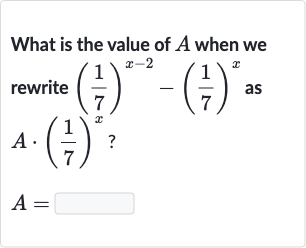AI tutor
Full solution
Q. What is the value of when we rewrite as ?
- Factor out : We need to express the given expression in the form of . To do this, we will factor out from both terms.
- Rewrite : First, let's rewrite by separating the exponent into two parts: .
- Calculate : Now, we know that is equal to , which is . So, can be rewritten as .
- Substitute back into expression: Substitute this back into the original expression: $\(49\) \times \left(\frac{\(1\)}{\(7\)}\right)^{x} - \left(\frac{\(1\)}{\(7\)}\right)^{x}.
- Factor out \((\frac{1}{7})^{x}\): Now, factor out \((\frac{1}{7})^{x}\) from both terms: \((\frac{1}{7})^{x} \times (49 - 1)\).
- Calculate expression inside parentheses: Calculate the expression inside the parentheses: \(49 - 1 = 48\).
- Final expression in desired form: We now have the expression in the desired form: \(A \times \left(\frac{1}{7}\right)^{x}\), where \(A\) is \(48\).
More problems from Compare linear and exponential growth
QuestionGet tutor help
QuestionGet tutor help
QuestionGet tutor help
QuestionGet tutor help
QuestionGet tutor help
QuestionGet tutor help
QuestionGet tutor help

